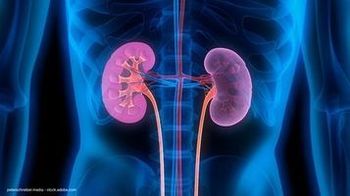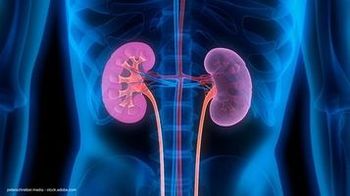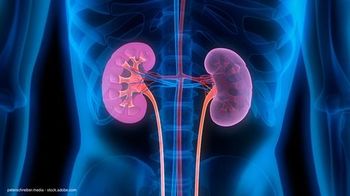
Study confirms usefulness of amitriptyline in IC
San Antonio--The tricyclic antidepressant amitriptyline (Elavil) has long been used for interstitial cystitis, but now, long-term data confirm its usefulness, even when patients don't fit the strict research definition of IC provided by the National Institute of Diabetes and Digestive and Kidney Diseases. Key to long-term success is allowing patients to titrate the dose themselves.
San Antonio-The tricyclic antidepressant amitriptyline (Elavil) has long been used for interstitial cystitis, but now, long-term data confirm its usefulness, even when patients don't fit the strict research definition of IC provided by the National Institute of Diabetes and Digestive and Kidney Diseases. Key to long-term success is allowing patients to titrate the dose themselves.
Arndt van Ophoven, MD, PhD, assistant professor of urology at the University of Münster, Germany, presented the first formal study of amitriptyline for IC that demonstrated its effectiveness at last year's American Urological Association meeting. Now he has looked at amitriptyline's performance long-term and in patients who met at least one of the NIDDK exclusion criteria for IC. His team's findings were presented at the AUA annual meeting here.
Ninety-four IC patients, including 82 women and 12 men, took amitriptyline for a mean of 19 months. Of the 94 patients, 59 met all NIDDK criteria; 35 patients met one or more exclusion criteria. For example, 33 patients did not demonstrate Hunner's ulcers or glomerulations on hydrodistention under anesthesia.
"Effectiveness will reach a plateau, most probably within the first 4 to 6 weeks," Dr. van Ophoven told Urology Times. "Patients will recognize very early if they have to titrate to high doses."
To assess results, the investigators used patient reporting on the Global Response Assessment (GRA) questionnaire, which allows patients to rate their symptoms on a seven-point scale ranging from markedly better to markedly worse. Investigators also asked patients to rate their pain and urgency intensities on a visual analog scale, record their daily frequency, and rate their satisfaction with treatment. Functional bladder volume and mean scores on the O'Leary-Sant Symptom and Problem Indices also were measured.
Patients who said they had from slight to marked improvement on the GRA were considered responders. About 60% of patients responded, whether they met all NIDDK diagnostic criteria or not (63.8% overall, 64.4% of NIDDK-defined IC patients ,and 62.8% of non-NIDDK-defined IC patients). Improvement in pain score, urgency, frequency, functional bladder volume, and all other symptom assessments were statistically significant compared with baseline and were sustained. Here, too, there were no significant differences between the NIDDK- and non-NIDDK-criteria groups.
Side effects were significant. As urologists know, dry mouth, weight gain, and constipation can be significant with anticholinergics. In general, patients were willing to accept the side effects in exchange for the benefits. The dropout rate was 31% (29 patients), and side effects were the reason for 86% of those discontinuations.
"Individual dose titration is a very powerful tool to diminish the anticholinergic side effects," said Dr. van Ophoven, adding that giving patients control over their dose is the most important key to managing side effects.
Expanding therapy's reach
Not only has this study corroborated the effectiveness of amitriptyline in managing IC, but it also supports the trend to expand effective IC therapy to patients who have IC symptoms, but who don't always meet the strict criteria that have made up NIDDK's research definition of IC. In a study led by Philip Hanno, MD, of the University of Pennsylvania, Philadelphia, 60% of patients whom IC experts believed have had IC did not fit those strict criteria.
"This study may also shed some interesting light regarding the importance of the NIDDK criteria for future clinical trials," added Dr. van Ophoven.
After the NIDDK's Interstitial Cystitis Cooperative Research Network finishes its mission to study amitriptyline's effectiveness in newly diagnosed IC patients, this agent may prove even more useful than this long-term study indicates.
Newsletter
Stay current with the latest urology news and practice-changing insights — sign up now for the essential updates every urologist needs.





